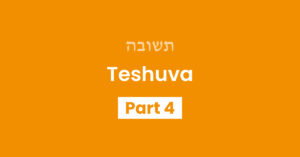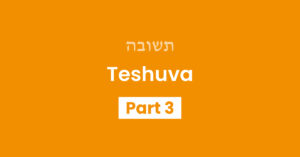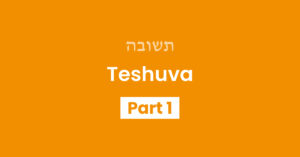We are now in the month of Elul, and Rosh Hashana is just a few short weeks away.
Last week, we spoke about what it means to make a Cheshbon HaNefesh – an “accounting” of the soul. Just as an accountant looks at all aspects of his business to see whether his profits are outweighing his expenses, we would each benefit from making a personal “accounting of our souls” to see if our actions are bringing us eternal “profit” (pleasure) or eternal “debt” (pain, shame, and regret).
Although this Cheshbon HaNefesh is most often done in retrospect – after the deed is already done – it is most helpful if we can train ourselves to make this Chesbon HaNefesh in advance – when we are still in the process of deciding what to do. The more we train ourselves to think before we act, and to consider the long-term consequences of our actions, the more likely we will be to make the right choices and enjoy eternal pleasure from closeness to Hashem in the World to Come.
The Hardest Step
After we do a Cheshbon HaNefesh, we can then proceed to do the 3 essential steps of Teshuva: (1) Vidui (verbally confessing what we did), (2) Charata (regretting the sin), and (3) Azivas HaCheit (resolving never to repeat the sin again). According to Rabbeinu Yonah1, each of these 3 steps is essential; without any one of them, a person’s Teshuva is incomplete.
Often, Azivas HaCheit is the hardest step to do. Azivas HaCheit means to resolve deep inside of yourself that you will never repeat this sin again2.
This requirement may seem like a very high bar to reach, and it can feel overwhelming. How can we completely change our habits, and commit to never repeat a sin again? How many times have we felt remorse over the fact that we forgot to make brachos, said lashon hara, or expressed anger at another person… we resolved never to do it again, but then we find ourselves repeating the same sin over and over?
In order to do a full and complete Azivas HaCheit, we have to think carefully and strategically, and make a reasonable plan for the future. It might be that we have to just take baby steps at first, or that we must set up gedarim (fences) to prevent ourselves from even coming close to repeating the same mistake. True Azivas HaCheit is an essential part of the Teshuva process. But how to achieve that strong, lasting committment to never doing the sin again is something that requires a lot of careful thinking and self-awareness.
But in the meantime, even if we haven’t yet reached the point of doing a full Azivas HaCheit, we must not lose hope! There is still something very powerful we can do right now: Even if we can’t yet promise to change ourselves totally forever, at the very least, now in Elul is the time to act differently as much as we can.
Even if we can’t yet promise to change ourselves totally forever, at the very least, now in Elul is the time to act differently as much as we can.
Elul: A Time for “Active” Teshuva
We know that both Elul and Tishrei are special times for doing Teshuva. So what׳s the difference between them?
Rav Shimshon Dovid Pincus zt”l3 explains: Elul is the time for changing our external behaviors, whereas Tishrei is for using special “tools” to complete the Teshuva process.
Elul is the time for changing our external behaviors, whereas Tishrei is for using special “tools” to complete the Teshuva process.
During Tishrei, we were given many “tools” to help us achieve Hashem’s forgiveness: The sound of the shofar awakens Heavenly mercy4; reciting Hashem’s 13 Middos of Mercy arouses Hashem to forgive us5; and even merely living through the day of Yom Kippur itself is something that brings atonement6.
But Elul is different. In Elul, we do not yet have these powerful tools of the shofar, the 13 Attributes of Mercy, and Yom Kippur. In Elul, the only tool for doing Teshuva is ourselves. Elul is the time for “active” teshuva – changing our external behaviors and acting differently from how we did before. Then, if we maximize our time in Elul to act differently as much as we can, Hashem will help complete our process of Teshuva by giving us the “gifts” of the shofar, the 13 middos of mercy, and Yom Kippur next month, in Tishrei.
In Elul, the only tool for doing Teshuva is ourselves
As Rav Pincus writes: The difference between Elul and Tishrei is the difference between walking with your own two feet, versus flying on a plane. Elul is the time to invest our own effort in changing our behaviors, whereas Tishrei is the time for “flying” high with the help of Hashem’s special siyyatta dishmaya (assistance). If we stretch ourselves a little farther now during Elul, Hashem will complete the process and help us along the rest of the way when we get to Tishrei.
Interestingly, this difference between the purpose of Elul and Tishrei actually traces back to Moshe Rabbeinu after the sin of the Golden Calf. Just as Moshe Rabbeinu worked hard to acquire the Torah during Elul… and then finally received the gift of the Second Luchos in Tishrei (on Yom Kippur), we, too must work hard during Elul, and in that merit we will receive Hashem’s gift of forgiveness on Yom Kippur.
As Rav Pincus points out: Even if we feel like certain mitzvos are above our current madreigah (spiritual level), it is worthwhile to make the extra effort to do them during Elul anyway. Even if we cannot always make brachos with kavannah, we can try to do it now in Elul as much as we can. Even if we cannot always hold back our tongues from saying angry words, we can try at least a few times to do that during Elul.
Even if we aren’t perfect yet, we can still stretch ourselves during this month of Elul to show Hashem how much we are sincerely trying to grow. If we do that this monthn, then we will merit to receive Hashem’s gift of forgiveness next month, in Tishrei.
Sources: [1] Shaarei Teshuva 1:19; [2] Orchos Tzaddikim: Shaar HaTeshuva; [3] Sichos R’ Shimshon Dovid Pincuz zt”l: Yamim Nora’im, pg. 43 -50; [4] Vayikra Rabbah 29:8; [5] Rosh Hashana 17b; [6] See Vayikra 16:30
Your Challenge
Identify 1 action that you have done wrong in the past, and do it correctly today.
Optional: Try to do the other 2 steps of Teshuva at the same time: (1) Vidui (verbally confessing what you did in the past) and (2) Charata (feeling regret for what you did).
FOR EXAMPLE:
- In the past, I was not careful to cover my whole hand with water when washing Netilas Yadayim. I feel awful that I was negligent in doing Hashem’s mitzvos! When I wash my hands right now, I’m going to do it right.
- In the past, I have forgotten to make brachos before eating. I can’t believe I “stole” Hashem’s food without thanking Him! Before I eat right now, I’m going to make a bracha.
Torah Questions
- Fill in the Blank: Shmuel HaNavi told the entire Jewish people: “If you do teshuva and return to Hashem with all your hearts, and remove the idols from among you… Hashem will save you from the hands of ______?” (Shmuel I Chapter 7)
- According to Yechetzkel 14:7, where should a person go if he realized he committed a sin?
- In Yechezkel 33:11, Hashem urges the evil person to do teshuva because Hashem does not want _____?
- Rabbi Eliezer said (Pirkei Avos 2:10) that a person should do teshuva on the day before he dies. But how can a person ever know what day he will die? How does Gemara (Shabbos 153a) answer this question?
- According to Reish Lakish (Yoma 86b), if a person does teshuva after doing an intentional sin, his sin will either be upgraded to be considered as merely an accidental sin, or it might even be upgraded into a merit! What factor determines whether it will be considered an accidental sin or a merit?
Questions to Ponder
- Imagine someone came to you and said: “I keep messing up with this particular aveira, and I try to stop doing it, but every time, it doesn’t work! I slip up again and again and again!” What advice would you give to them? What kind of techniques have you used to successfully change your habits in the past? What has worked for you, and what has not worked?
- About King Yoshiyahu, the Navi writes: “There was never any king before or after him who did teshuva as well as he did.” (Melachim II 23:25) Really?
What was so unique about Yoshiyahu’s teshuva? - The Gemara (Brachos 19a) says: “If you see a talmid chochom doing a sin at night, you should forget about it by the next day because he certainly did teshuva by the next day.” Why does the Gemara make this statement about a “talmid chochom” and not a “tzaddik”?
- The Gemara (Yoma 86b) says that when an individual person does teshuva, Hashem forgives the entire world! How could this be? How could one person’s actions affect the entire world?





